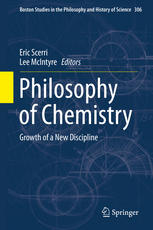Volume 306 of the series Boston Studies in the Philosophy and History of Science pp 73-89
Pragmatism and the Philosophy of Chemistry
- Joseph E. EarleySr.Affiliated withDepartment of Chemistry, Georgetown University Email author
Abstract
Charles Sanders Peirce (1840–1908) is generally recognized as the founder of ‘Pragmatism’—a distinctively American philosophical approach that is relevant to major unsolved problems of current philosophy. Peirce did his graduate studies in chemistry and he identified himself as a chemist throughout his career, but his work is seldom cited in current philosophy of chemistry. Following Peirce, pragmatists hold that philosophy and science are closely-related human evolutionary adaptations and that neither attains to certainty—but rather that either may result in understanding that is adequate for specific purposes. Peirce made major contributions to the logic of relations and the theory of signs (‘semiotic’) and vigorously rejected ‘nominalism,’ the doctrine (often tacitly assumed) that characteristics of composite entities can be understood solely in terms of the properties of their components. With respect to the determination of outcomes of irreversible (“finious”) processes, Peirce understood causality in an unusually broad sense. Additional attention to the work of Peirce and later pragmatists would be helpful for philosophy of chemistry. For instance, Process Structural Realism (PSR) combines aspects of pragmatism with other approaches to understand how closure of networks of dynamic processes leads to far-from-equilibrium coherences that exert significant influence. Such understanding is critically important for problems of present philosophic and practical interest.
Keywords
Pragmatism Chemistry Peirce Dewey Nominalism Causality Irreversible processes Process structural realism Finious Downward causation Structures as causes- Title
- Pragmatism and the Philosophy of Chemistry
- Book Title
- Philosophy of Chemistry
- Book Subtitle
- Growth of a New Discipline
- Pages
- pp 73-89
- Copyright
- 2015
- DOI
- 10.1007/978-94-017-9364-3_6
- Print ISBN
- 978-94-017-9363-6
- Online ISBN
- 978-94-017-9364-3
- Series Title
- Boston Studies in the Philosophy and History of Science
- Series Volume
- 306
- Series ISSN
- 0068-0346
- Publisher
- Springer Netherlands
- Copyright Holder
- Springer Science+Business Media Dordrecht
- Additional Links
- Topics
- Keywords
-
- Pragmatism
- Chemistry
- Peirce
- Dewey
- Nominalism
- Causality
- Irreversible processes
- Process structural realism
- Finious
- Downward causation
- Structures as causes
- Industry Sectors
- eBook Packages
- Editors
-
-
Eric Scerri
 (5)
(5)
-
Lee McIntyre
 (6)
(6)
-
Eric Scerri
- Editor Affiliations
-
- 5. Department of Chemistry and Biochemistry, University of California
- 6. Center for Philosophy and History of Science, Boston University
- Authors
- Author Affiliations
-
- 7. Department of Chemistry, Georgetown University, Washington, DC, 20057, USA
Continue reading...
To view the rest of this content please follow the download PDF link above.



